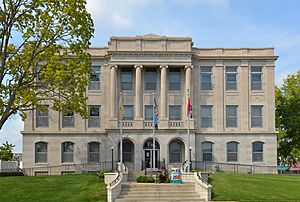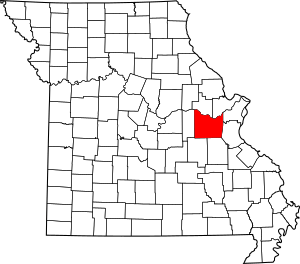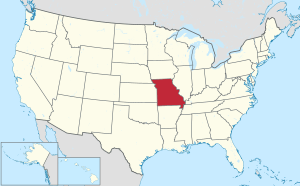Franklin County, Missouri facts for kids
Quick facts for kids
Franklin County
|
||
|---|---|---|

The Franklin County Courthouse in Union
|
||
|
||

Location within the U.S. state of Missouri
|
||
 Missouri's location within the U.S. |
||
| Country | ||
| State | ||
| Founded | December 11, 1818 | |
| Named for | Benjamin Franklin | |
| Seat | Union | |
| Largest city | Washington | |
| Area | ||
| • Total | 931 sq mi (2,410 km2) | |
| • Land | 923 sq mi (2,390 km2) | |
| • Water | 8.0 sq mi (21 km2) 0.9% | |
| Population
(2020)
|
||
| • Total | 104,682 |
|
| • Density | 110/sq mi (40/km2) | |
| Time zone | UTC−6 (Central) | |
| • Summer (DST) | UTC−5 (CDT) | |
| Congressional district | 2nd | |
Franklin County is located in the U.S. state of Missouri. At the 2020 census, the population was 104,682. Its county seat is Union. The county was organized in 1818 and is named after Founding Father Benjamin Franklin. Franklin County is part of the St. Louis, MO-IL Metropolitan Statistical Area and contains some of the city's exurbs. It is located along the south side of the Missouri River. The county has wineries that are included in the Hermann AVA (American Viticultural Area) and is part of the region known as the Missouri Rhineland, which extends on both sides of the Missouri River.
Contents
History
Occupied by succeeding cultures of indigenous peoples, this area was populated by the historic Osage tribe at the time of European encounter. The region was first settled by Europeans during the rule of the Spanish Empire. The Spanish log fort San Juan del Misuri (1796–1803) was built in present-day Washington. After the American Revolutionary War, migrants from the new United States started moving West. Among them were the family and followers of Daniel Boone, an explorer from Kentucky who settled the area starting in 1799. For the next two decades, most settlers came from the Upper South, especially Kentucky and Virginia, bringing their slaves with them to work the land.
In 1833 substantial numbers of German immigrant families began settling in the area, and soon they outnumbered the slave owners in the county. The German newcomers were opposed to slavery, and their sons would become Union supporters during the U.S. Civil War. Former governor and then Confederate General Sterling Price led his cavalry through the county during his Missouri raid of 1864.
Before the war Franklin County had been served by steamboats that moved freight and passenger traffic on the Missouri River. Afterwards, it became a railroad transportation center. Manufacturing industries were established at the end of the Civil War and successive ones have continued.
Bias Vineyard, near the small city of Berger, is located within the Hermann American Viticultural Area (AVA), designated in 1983. Röbller Vineyard and Winery near New Haven is also in the Hermann AVA. Wineries along both sides of the Missouri River are part of the Missouri Rhineland, whose vineyards were started by German immigrants in the mid-19th century. Before Prohibition, Missouri was the second-largest wine-producing state in the nation. Everything was closed down except for limited production of wine allowed for religious purposes. The state's wine industry had to be completely rebuilt, which has been taking place since the 1960s.
Geography
According to the U.S. Census Bureau, the county has a total area of 931 square miles (2,410 km2), of which 923 square miles (2,390 km2) is land and 8.0 square miles (21 km2) (0.9%) is water. It is the fourth-largest county in Missouri by land area and third-largest by total area.
The center of the Missouri River forms the nominal northern border of the county, although the river has changed its course since boundaries were first established: a portion of St. Charles County near St. Albans is now south of the river, while a portion of Franklin County near Augusta is north of the river.
The Bourbeuse River flows for 107 miles through the county. It cuts a deep, narrow valley and is very crooked. It empties into the Meramec River near Union. This river is mostly undeveloped, with limited access and few bridges over it. During low water, a number of fords allow crossing.
The county is located in the Ozarks region, with steep hills and deep valleys, caves, springs, and sinkholes characteristic of karst areas. The underlying rock is typically carbonate, including limestone and dolomite. Mining activity in the county included ores of lead, copper, zinc, and deposits of refractory clay. The soils in most of the county tend to be thin, rocky red clay, and are poor for most agriculture, while the soil near the Missouri River is dark, rich, and thick, and used primarily for row crops such as corn, wheat, and soybeans. Much of the county is covered with thick forests, reestablished since the 1920s.
Urbanization is increasing in the county, especially surrounding Washington and Union, and along Interstate 44. St. Albans is now a continuation of the suburban region of St. Louis County while the majority of the county retains a rural character and includes extensive wilderness areas, typical of exurban areas.
Adjacent counties
- Warren County (north)
- St. Charles County (northeast)
- St. Louis County (northeast)
- Jefferson County (east)
- Washington County (southeast)
- Crawford County (southwest)
- Gasconade County (west)
Major highways
 Interstate 44
Interstate 44 U.S. Route 50
U.S. Route 50 U.S. Route 66 (1926–79)
U.S. Route 66 (1926–79) Route 30
Route 30 Route 47
Route 47 Route 100
Route 100 Route 185
Route 185
Demographics
| Historical population | |||
|---|---|---|---|
| Census | Pop. | %± | |
| 1820 | 2,379 | — | |
| 1830 | 3,484 | 46.4% | |
| 1840 | 7,515 | 115.7% | |
| 1850 | 11,021 | 46.7% | |
| 1860 | 18,085 | 64.1% | |
| 1870 | 30,098 | 66.4% | |
| 1880 | 26,534 | −11.8% | |
| 1890 | 28,056 | 5.7% | |
| 1900 | 30,581 | 9.0% | |
| 1910 | 29,830 | −2.5% | |
| 1920 | 28,427 | −4.7% | |
| 1930 | 30,519 | 7.4% | |
| 1940 | 33,868 | 11.0% | |
| 1950 | 36,046 | 6.4% | |
| 1960 | 44,566 | 23.6% | |
| 1970 | 55,116 | 23.7% | |
| 1980 | 71,233 | 29.2% | |
| 1990 | 80,603 | 13.2% | |
| 2000 | 93,807 | 16.4% | |
| 2010 | 101,492 | 8.2% | |
| 2020 | 104,682 | 3.1% | |
| U.S. Decennial Census 1790-1960 1900-1990 1990-2000 2010-2015 2020 |
|||
As of the census of 2000, there were 93,807 people, 34,945 households, and 25,684 families residing in the county. The population density was 102 inhabitants per square mile (39/km2). There were 38,295 housing units at an average density of 42 units per square mile (16/km2). The racial makeup of the county was 97.47% White, 0.94% Black or African American, 0.27% Asian, 0.24% Native American, 0.02% Pacific Islander, 0.20% from other races, and 0.86% from two or more races. Approximately 0.72% of the population were Hispanic or Latino of any race. 44.9% were of German, 13.0% American, 10.7% Irish and 7.7% English ancestry.
There were 34,945 households, out of which 36.10% had children under the age of 18 living with them, 60.40% were married couples living together, 9.00% had a female householder with no husband present, and 26.50% were non-families. 22.10% of all households were made up of individuals, and 8.90% had someone living alone who was 65 years of age or older. The average household size was 2.66 and the average family size was 3.11.
In the county, the population was spread out, with 27.40% under the age of 18, 8.20% from 18 to 24, 30.00% from 25 to 44, 22.40% from 45 to 64, and 12.10% who were 65 years of age or older. The median age was 36 years. For every 100 females there were 98.50 males. For every 100 females age 18 and over, there were 95.80 males.
The median income for a household in the county was $54,392, and the median income for a family was $62,969. Males had a median income of $35,849 versus $23,344 for females. The per capita income for the county was $24,529. About 4.50% of families and 7.00% of the population were below the poverty line, including 7.90% of those under age 18 and 8.80% of those age 65 or over.
2020 Census
| Race | Num. | Perc. |
|---|---|---|
| White (NH) | 95,680 | 91.4% |
| Black or African American (NH) | 880 | 0.84% |
| Native American (NH) | 291 | 0.3% |
| Asian (NH) | 532 | 0.51% |
| Pacific Islander (NH) | 31 | 0.03% |
| Other/Mixed (NH) | 5,063 | 4.83% |
| Hispanic or Latino | 2,205 | 2.11% |
Economy
The unemployment rate in Franklin County is 2.9% as of December 2018, below state and national averages.
Manufacturing accounts for the most (23.8%) employment in Franklin County, primarily in the cities of Washington and Union, followed by trade, transportation and utilities (18.8%), education and health care (17.7%), and construction (11.3%).
The biggest employers in Franklin County are the manufacturing firms of Magnet LLC, Cardinal Brands Hazel Division, GDX Automotive, Sporlan Valve Company, Esselte, Silgan, Buddeez, and Meramec Group Inc. as well as the Meramec Valley R-III School District in the public education sector and Schatz Underground Cable Inc. in the construction industry. Small farms and wineries also greatly contribute to the economy in Franklin County.
Education
The highest educational attainment in Franklin County consists of the following:
- High School Graduates: 59.1%
- Associate Degree: 10.6%
- Bachelor's Degree: 10.9%
- Graduate Degree: 7.5%
School districts
School districts in the county:
- Crawford County R-I School District
- Gasconade County R-I School District
- Gasconade County R-II School District
- Meramec Valley R-III School District
- New Haven School District
- St. Clair R-XIII School District
- Sullivan C-2 School District
- Union R-XI School District
- Washington School District
Elementary:
- Franklin County R-II School District
- Lonedell R-XIV School District
- Richwoods R-VII School District
- Spring Bluff R-XV School District
- Strain-Japan R-XVI School District
Public schools
- New Haven Public School District - New Haven
- New Haven Elementary School (K–6)
- New Haven Middle School (7–8)
- New Haven High School (9–12)
- Meramec Valley R-III School District – Pacific
- Meramec Valley Community School (Pre-K) – Pacific
- Meramec Valley Early Childhood Center (Pre-K) – Pacific
- Truman Elementary School (K–5) – Pacific
- Robertsville Elementary School (K–5) – Robertsville
- Zitzman Elementary School (K–5) – Pacific
- Nike Elementary School (K–5) – Catawissa
- Coleman Elementary School (K–5) – Villa Ridge
- Riverbend School (8) – Pacific
- Meramec Valley Middle School (6–7) – Pacific
- Pacific High School (9–12) – Pacific
- St. Clair R-XIII School District – St. Clair
- St. Clair Elementary School (K–2)
- Edgar Murray Elementary School (3–5)
- St. Clair Jr. High School (6–8)
- St. Clair High School (9–12)
- – Spring Bluff
- Spring Bluff R-XV (k-8)
- Sullivan School District – Sullivan
- Sullivan Primary School (Pre-K–1)
- Sullivan Elementary School (2–5)
- Sullivan Middle School (6–8)
- Sullivan High School (9–12)
- Union R-XI School District – Union
- Beaufort Elementary School (K–6) – Beaufort
- Central Elementary School (K–3) – Union
- Clark-Vitt Elementary School (4–6) – Union
- Union Middle School (7–8) – Union
- Union High School (9–12) – Union
- Washington School District – Washington
- Family Resource Center (Pre-K) – Washington
- Washington West Elementary School (Pre-K–6) – Washington
- South Point Elementary School (K–6) – Washington
- Marthasville Elementary School (K–6) – Marthasville
- Labadie Elementary School (K–6) – Labadie
- Clearview Elementary School (Pre-K–6) – Union
- Campbellton Elementary School (K–6) – New Haven
- Augusta Elementary School (Pre-K–06) – Augusta
- Washington Middle School (7–8) – Washington
- Washington High School (9–12) – Washington
- Franklin County R-II School District – New Haven
- Franklin County Elementary School (K–8) – New Haven
- Lonedell R-XIV School District – Lonedell
- Lonedell Elementary School (K–8) – Lonedell
- Owensville R-II School District – Gerald
- Gerald Elementary School (K–5) – Gerald
- Strain-Japan R-XVI School District - Sullivan
- Strain-Japan Elementary School (K-08) - Sullivan
Private schools
- Cornerstone Christian Academy – St. Clair – (1–12) – Other Affiliation
- Crosspoint Christian School – Villa Ridge – (K–12) – Nondenominational Christianity
- Immanuel Lutheran School – Washington – (K–8) – Lutheran
- St. Francis Borgia Regional High School – Washington – (9–12) – Roman Catholic
- St. John the Baptist School – Villa Ridge – (Pre-K–8) – Roman Catholic
- St. Gertrude School – Kraków – (K–8) – Roman Catholic
- St. Francis Borgia Grade School – Washington – (Pre-K–8) – Roman Catholic
- Our Lady of Lourdes – Washington – (Pre-K–8) – Roman Catholic
- St. Clare Catholic Grade School – St. Clair – (Pre-K–8) – Roman Catholic
- St. Bridget of Kildare School – Pacific – (Pre-K–8) – Roman Catholic
Alternative schools
- Autumn Hill State School (K–12) – Union – Handicapped/Special needs
- Franklin County Special Education Cooperative (Pre-K–12) – St. Clair – Special Education
- Four Rivers Career Center (9–12) – Washington – Vocational/Technical
Colleges/universities
- East Central College – Union
Public libraries
- Gerald Area Library
- Scenic Regional Library
- Sullivan Public Library
- Washington Public Library
Communities
Cities
- Berger
- Gerald
- St. Clair
- New Haven
- Pacific (small part in St. Louis County)
- Sullivan (partial)
- Union (county seat)
- Washington
Villages
- Charmwood
- Leslie
- Miramiguoa Park
- Oak Grove Village
- Parkway
Census-designated places
- Gray Summit
- Lake St. Clair
- Stanton
- Villa Ridge
Unincorporated communities
- Anaconda
- Beaufort
- Beemont
- Boles
- Campbellton
- Catawissa
- Champion City
- Clover Bottom
- Dissen
- Dundee
- Elmont
- Etlah
- Gildehouse
- Hemker
- Huff
- Jaegers Shop
- Japan
- Jeffriesburg
- Kiel
- Kohl City
- Krakow
- Labadie
- Lonedell
- Luebbering
- Lyon
- Maupin
- Monday
- Moselle
- Mount Hope
- Neier
- Noser Mill
- Oetters
- Port Hudson
- Robertsville
- Spring Bluff
- St. Albans
- Strain
See also
 In Spanish: Condado de Franklin (Misuri) para niños
In Spanish: Condado de Franklin (Misuri) para niños


